#petty bourgeoisie
Explore tagged Tumblr posts
Text
astagfirullah theres an nft art and cryptocurrency workshop in my town and its supported by the local government, punk and metal concert promoters, and the local alt radio station

#i gotta say... we used to have actual radicals#the guy who ran one of the event organizing stuff was anarchists#they had food not bombs in their zine workshops#but going forward... all of the people i know have gotten more liberal...#our scene is small and its mixed up with poetry nerds... genuine punk/metalheads and artisans aspiring to make a living with their work#and unfortunately the apolitical artist nerds won over and the ppl with some integrity to not have petty bourgeoisie aspirations are gettin#pushed out. it starts with the sponsors with cigarette brands.... and now this#bunch of fucking idiots all of you#im not surprised if someone in the scene starts endoring political candidates or being buddies with cops#fuck yall#textposts
7 notes
·
View notes
Text

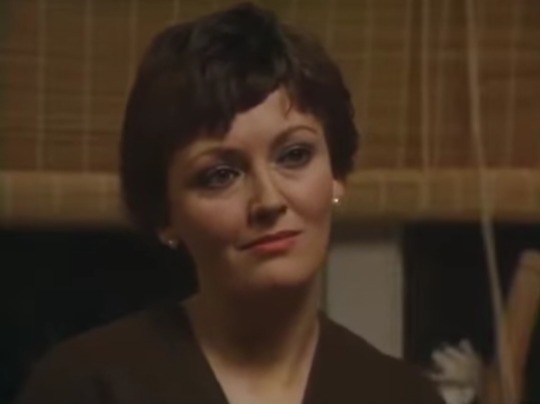
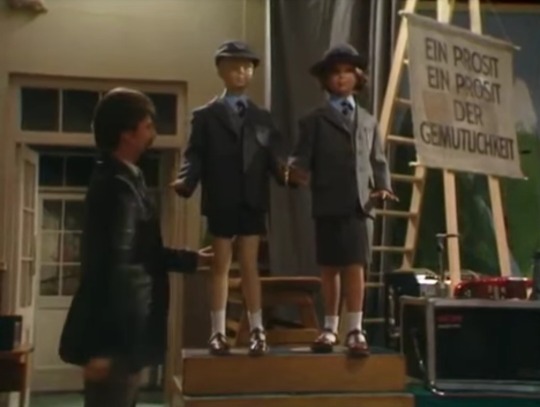
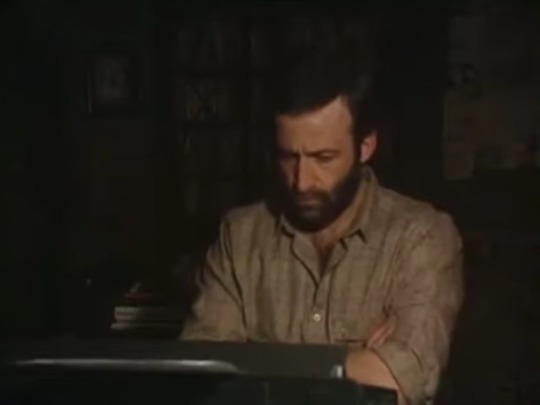
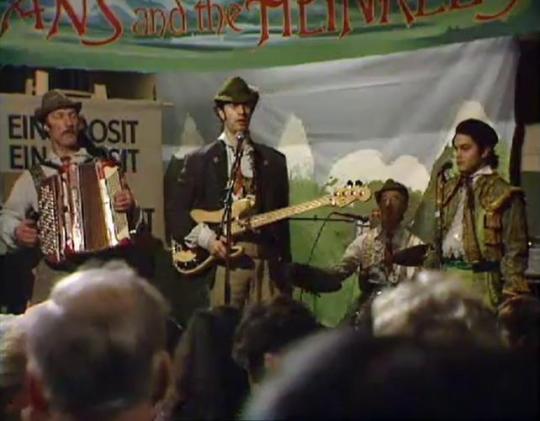
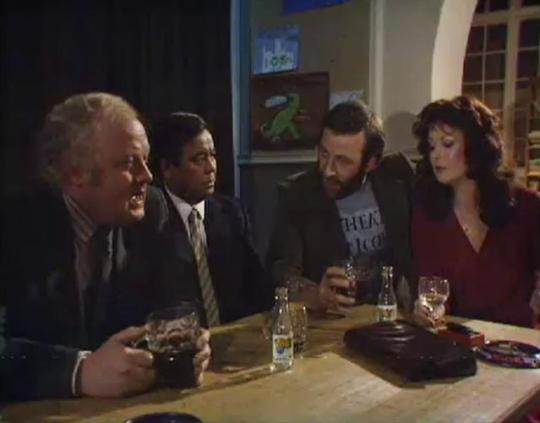
Play for Today: Bavarian Night (BBC, 1981)
"These bloody middle class parents, ooh, they do get up my nose! You can work yourself blue in the face for them, go out of your way to accommodate them, but it's no use! They're just out to carve and criticise and try to make a fool out of you! Oh, I felt like - I'm ashamed to tell you what I felt like."
"Giving her a good hiding?"
"Yes, somebody should have done, I don't mind saying so! Oh, they make me sick! Always had their own way, always had the best of everything; she should have been brought up in our house, my dad would've had her sorted! I'm sorry, Estelle, this isn't like me, I know. Well, that's my evening spoilt for a start!"
"But what about the sausages?"
#play for today#bavarian night#1981#single play#andrew davies#jack gold#bob peck#sarah badel#malcolm terris#arwen holm#barrie rutter#gawn grainger#kristopher kum#allan surtees#christine hargreaves#noel collins#brian protheroe#jack chissick#karen craig#a comparatively rare original work from Davies‚ who already in 81 was known chiefly for his adaptations of the work of others#a comic piece about a teacher parent social evening which descends into predictable chaos what with the heavy consumption of alcohol and#the loudly decried lack of sausages. Davies' script is frequently very witty‚ sometimes very funny indeed‚ but in a rather grotesque way#you can tell there's little warmth in his writing for most of the characters on display here: the late great Peck is the ostensible lead‚ a#hypocritical intellectual who waxes lyrical about his love for his children but who really just mines them for material for his job as a#scriptwriter; Rutter's would be progressive young head teacher quickly reveals his reactionary‚ petty nature‚ while Grainger is positively#repulsive as a middle class fascist whose desire to teach the younger generation he despises a lesson in manners is tempered only by his#own cowardice. warmth is reserved only for Badel‚ as Peck's cheating wife who at least retains a streak of humanity and a willingness to#stand by her (mildly) socialist principles‚ and particularly for Kum as the sole parent actually interested in learning more about his#daughter's education and progress (and whose bemused response to the increasingly bacchanalian mood of the evening is often the funniest#thing here). a sharp satirical piece on the mores of 80s English suburbia and the petite bourgeoisie‚ and a genuinely funny play
5 notes
·
View notes
Text
sometimes it's flooring just how much mainstream culture (not just media but like what and how people talk online or what products r available and stuff) holds the standards of affluent/upper middle class people when most people have nowhere near that kind of money, never have and never will. but i guess that's why they call it the dictatorship of the bourgeoisie
#it's just a lot caters to ppl straddling the line of petty bourgeois who think they're the average#instead of the like haute bourgeoisie ig who r very clearly undeniably setting the terms for everyone else
4 notes
·
View notes
Text
Holy shit read Marx please Jesus.
So much wrong here I actually cant.
I fucking hate this "capitalism is when you make money, the more money you make, the more capitalism it is" mindset people have gotten. No, an artist selling their own work is not them engaging in capitalism, it's literally a worker owning their own means of production.
Remember capitalism is someone profiting off of someone else's labor though owning capital. It is not simply the act of profiting at all.
17K notes
·
View notes
Text
I forgot how petty bourgeois liberal y'all mfs are who gives a shit ab intellectual property you will neverrrrrrrrrr be on the level of the haute bourgeoisie and those laws do not protect YOU. None of your ideas are original, don't defend laws that don't benefit anyone in the long term other than corporations and the bourgeoisie.
#my take as a commie#yes i hate the petty bourgeoisie too#that means small business owners#like yall#idc#goodbye
1 note
·
View note
Text
Dude my friends grandpa is a local right-wing politician and im in his car rn help

#he’s shit talking Democrats and I can agreee with him BUT my secret trap card is that I also despise his politics too#leftism#socialism#he’s part of the petty bourgeoisie so although his class character is still more in the interest of the working class he benefits off of the#Privilege of the bourgeois political affiliation#can’t stand these people istfg but it’s nice opposition research ig
0 notes
Text
The panic about "ai" is particularly annoying for the fact that it's a hop and a skip from capitulating to anti piracy calls from these writers which with an ounce of class analysis people rallying behind them under the banner of the "artist" and the elevation of creativity to these sacred and frankly annoying levels would realise that they'll also get fucked over not just by the copyright laws but also the anti piracy itself. These wealthy writers are only looking out for themselves idk why at any point anyone thought it'd be a "democratic win". Stephen King does not have the same class interest as you. Be fucking serious.
#and as always these anti piracy calls will hit the working class in the global south worst#i genuinely hate you petty bourgeoisie cunts so fucking much. you either have the same interest as the working class or an enemy to it#either case im putting your fucking ao3 shitty fanfic in a machine. fuck you lol#idk why this touting creativity as a a mystical thing that is heavenly gets on my nerves so much.#oh 'ai' writes terrible things. yeah so do most of you. like it's petty and ultimately not the bedrock of my grievances w all the clowns#involved in this. but it's so silly
1 note
·
View note
Text
I've managed to confuse myself about antebellum US politics again XD I mean it's weird because the rural/agricultural parties (Democratic-Republicans in the 1st, Democrats in the 2nd and 3rd party systems) were also the more anti-British, whereas the urban/bourgeois parties (Federalists, Whigs, Republicans* in the 1st, 2nd and 3rd party systems respectively) were more favourable towards Britain. But like the agricultural parties opposed tariffs because they relied on exports, while the industrial parties supported them to protect US industry. So you'd expect it to be the other way around? Like the planters to have closer links to British businesses so more sympathetic? I guess it must be something to do with the particular development of (Northern) US industry but idk enough to say what tbh
#Part of the realignment of the 3rd Party System was the Republicans winning over the rural petty bourgeoisie/small farmers in the North/West#so it wasn't completely a rural/urban divide#history#US history#antebellum#1st party system#2nd Party System#3rd Party System#historical materialism
0 notes
Text
TFW you just measure whether a society does something that you consider to be “bad” and if it does you measure it to be a failure and you ignore all the ways that it was vastly better than what came before or after it.
#like of course the ussr had problems#but please compare it to the Russian empire and capitalist Russia for once#also pay any attention to the situation they were in and how that situation affected their policy#we literally have to pay attention to these things if we want to learn any meaningful lessons from where the ussr did fail#if you don’t look at the situation in context you will just project your own dogma onto it#with actual analysis you can determine the good from the bad#anything else is idealism and often a manifestation of petty bourgeoisie ideology as well
0 notes
Text
Any analysis of fascism that posits the USA in 1776 as a fascist state is one where 'fascism' is just an edgier way to say 'capitalism' - what capitalism isn't fascist, in this view; and what's the purpose of the term in that case?
Fascism is a specific formulation of capitalism which emerges when the capitalist system is in extreme crisis (specifically a crisis of entrenched fixed capital devastating the rate of profit). It is characterised by the extension of imperial methods to the population of imperial core itself - an autocannibalism when all other sources of profit have dried up - and the mobilisation of the petty-bourgeoisie. It explicitly borrows the methods of settler-colonialism to apply not only to its colonies, but also to itself. Fascism is not simply 'when genocide happens' - capitalism under liberal-democracy carries out genocide just as well.
In this regard it is essentially appropriate to say that fascism has been superfluous in the USA - a fascist movement has historically never been able to seriously gain ground in the USA because the needs of fascism are already met by straightforward settler-colonialism. There has been no deep crisis to spur on fascism, and no need to divide the populace and expropriate some portion of it, because the USA already has an exploitative and expropriative relationship with its internal colonies. This arrangement is not fascist, it is straightforwardly colonial.
There can only be a real fascist movement and fascist state in the USA if two conditions are met: 1) the settler state can no longer wring enough profit out of the exploitation of the indigenous and black peoples; and, 2) serious economic failure and crisis threatens the existence of capitalism, by inspiring popular revolt and communist organisation.
845 notes
·
View notes
Text
dear lord help, the anti ai art people are starting to target people who made realistic reference painting
#im trying to be nice so badly rn#because a lot of my friends are artist and yes ai art could take away their livelihood#and its bad esp since most of them rely on art because they survive on the job market#but somehow the most anti ai art advocates for stricter copyright laws#which could destory fanarts and fanfics while letting big media properties thrive#and they always talk about how ai art is bad and should be banned because its soulless and talentless#a completely worthless discourse that ends up hurting people#whose art gets stolen and copied the most by ai#you petty bourgeoisie luddites are deeply unseries#textpost#disc horse
11 notes
·
View notes
Text
The proletariat needs the state — this is repeated by all the opportunists, social-chauvinists and Kautskyites, who assure us that this is what Marx taught. But they “forget” to add that, in the first place, according to Marx, the proletariat needs only a state which is withering away, i.e., a state so constituted that it begins to wither away immediately, and cannot but wither away. And, secondly, the working people need a "state, i.e., the proletariat organized as the ruling class". The state is a special organization of force: it is an organization of violence for the suppression of some class. What class must the proletariat suppress? Naturally, only the exploiting class, i.e., the bourgeoisie. The working people need the state only to suppress the resistance of the exploiters, and only the proletariat can direct this suppression, can carry it out. For the proletariat is the only class that is consistently revolutionary, the only class that can unite all the working and exploited people in the struggle against the bourgeoisie, in completely removing it. The exploiting classes need political rule to maintain exploitation, i.e., in the selfish interests of an insignificant minority against the vast majority of all people. The exploited classes need political rule in order to completely abolish all exploitation, i.e., in the interests of the vast majority of the people, and against the insignificant minority consisting of the modern slave-owners — the landowners and capitalists. The petty-bourgeois democrats, those sham socialists who replaced the class struggle by dreams of class harmony, even pictured the socialist transformation in a dreamy fashion — not as the overthrow of the rule of the exploiting class, but as the peaceful submission of the minority to the majority which has become aware of its aims. This petty-bourgeois utopia, which is inseparable from the idea of the state being above classes, led in practice to the betrayal of the interests of the working classes, as was shown, for example, by the history of the French revolutions of 1848 and 1871, and by the experience of “socialist” participation in bourgeois Cabinets in Britain, France, Italy and other countries at the turn of the century. All his life Marx fought against this petty-bourgeois socialism, now revived in Russia by the Socialist-Revolutionary and Menshevik parties. He developed his theory of the class struggle consistently, down to the theory of political power, of the state. The overthrow of bourgeois rule can be accomplished only by the proletariat, the particular class whose economic conditions of existence prepare it for this task and provide it with the possibility and the power to perform it. While the bourgeoisie break up and disintegrate the peasantry and all the petty-bourgeois groups, they weld together, unite and organize the proletariat. Only the proletariat — by virtue of the economic role it plays in large-scale production — is capable of being the leader of all the working and exploited people, whom the bourgeoisie exploit, oppress and crush, often not less but more than they do the proletarians, but who are incapable of waging an independent struggle for their emancipation. The theory of class struggle, applied by Marx to the question of the state and the socialist revolution, leads as a matter of course to the recognition of the political rule of the proletariat, of its dictatorship, i.e., of undivided power directly backed by the armed force of the people. The overthrow of the bourgeoisie can be achieved only by the proletariat becoming the ruling class, capable of crushing the inevitable and desperate resistance of the bourgeoisie, and of organizing all the working and exploited people for the new economic system. The proletariat needs state power, a centralized organization of force, an organization of violence, both to crush the resistance of the exploiters and to lead the enormous mass of the population — the peasants, the petty bourgeoisie, and semi-proletarians — in the work of organizing a socialist economy.
Vladimir Ilyich Lenin, The State And Revolution
286 notes
·
View notes
Text
american economists will do anything to call as many people as possible middle class. ive seen some measures go straight from "poor" to "lower middle class" so they can avoiding even saying the word "worker." it's a great way to try and convince everyone that they're a potential business owner so that they side with policies that benefit million-dollar megacorps and real estate cartels because it's "good for business"
#im late to a very mild discourse but basically “middle classes” are more specific term if you're doing a proper marxist analysis#refers to petty bourgeoisie peasants and other groups who share interests with both owners and workers#which tbf is a lot of Americans in that anyone who owns a house or has a retirement plan technically has a stake in the market#but i still think the line between working and middle is much higher income on average cuz most people r still wage laborers#although in general framing class as just income is how liberal analyses ignore/obfucscate the real dynamics at work
5 notes
·
View notes
Text
It's been a while since one has been passed around but does anyone remember when we'd periodically see people on here repost reports from undercover cops trying to get intel on activist/revolutionary groups and they came back with "we can't get anything because all these people do is lounge around, smoke weed, and form cliques over petty shit" and then the response on here would overwhelmingly be "haha it's so awesome that cops can't do anything because we pose no actual threat to bourgeoisie!"
265 notes
·
View notes
Note
lowkey that does seem to be what your old argument was implying about artists though, that if you own the intellectual property (as you do with your games) then that somehow automatically makes you an aspiring petit bourgeoisie. genuinely, am I misunderstanding something about your earlier description of the petit bourgeoisie as a concept? hope you're having a good day
yea like i mean it is just factually true that the position of the independent artist is not a proletarian one, most independent artists are artisans and the more succesful ones are petty bourgeois. but yknow class positions aren't like, rpg classes, innate aspects of the self, they're just relations to economic means of production. when i say that independent artists aspire to be petty bourgeois it is because quite simply that is the path to economic success for them! to make the next hazbin hotel or digital circus or whatever and be able to hire proletarian artists to work on their properties while retaining ownership and profiting from it.
the reason the bait ask was silly was because it was implying some kind of moral or artistic superiority in art created by proletarians (in their capacity as exploited labour), not because they correctly identified that d&d artist drawing epic wholesome found family art splashes and i have different economic relations to our work
218 notes
·
View notes
Note
Am I stupid or something because I agree with all of your post but I don't know what's wrong with small businesses. Am I a capitalist because I'm disabled and can only make money selling stickers or am I missing a bigger picture
Because this is tumblr and people in the notes will immediately read three lines of this and accuse me of pissing on the poor, I will begin with a disclaimer that I am neither comparing you to a Elon Musk nor calling you evil.
So, you sell stickers. I would assume that in this context you are selling your own stickers with your own designs, rather than working as a cashier selling someone else's stickers, since you're disabled and you mentioned you can't work a job. You are therefore selling a product you own (whether you produce the stickers entirely yourself or use a 3rd party company) for a profit at a (presumably) online store instead of selling your labour power for a wage. This, by definition would make you petit bourgeois.
When communists talk about class positions, it is not a question of an individual's morality, motivation or amount of income.
Being a small business owner (or petit bourgeois), means that your class interests and the class interests of the workers (the proletariat) come into conflict. As a clear example, let's say in this scenario that you are selling a sticker design on a 3rd party website that specialises in this service, and they source the actual physical stickers from factories around the world. Here, you are essentially selling your intellectual property to the company in exchange for some of the profits from its further sale. Perhaps many of those factories are in the global south, in countires with very low wages and few worker protections (due to intervention from imperial core bourgeoisie powers). One day, the political struggle for worker rights and higher wages is won in some of these countries, driving up the cost of production for the stickers. Perhaps there is also a victory for a union of delivery service workers at home in the imperial core, driving up wages and protections for them as well, further cutting into profits.
The function of the 3rd party sticker company is to strive for ever-increasing profits the capitalists who own it and its investors. The cut in profit will have to be made up elsewhere. This will be done by investing in political groups that are willing to repress worker movements within these countries, shifting production to countries that have yet to achieve these worker victories, cutting corners on their imperial core workers, increasing their price of service by taking a larger cut of your profits, or a mixture of some or all of these.
In that scenario, the proletarian class interests (higher wages, more protections and regulations) are in direct conflicts with the interests of the bourgeois 3rd party sticker company (higher profits, meaning lower wages and less protections and regulations) and by extension, yours, as your class interests also revolve around profit. When workers gain more power, it cuts into your profits. As a petit bourgeois, you are incetivised to support and pursue bourgeois and petty bourgeois politics such as IP laws.
As an individual, you can be whatever kind of person with whatever politics and views you have. As a petit bourgeois small business owner, you have a certain class position that comes with a certain set of class interests. You can always choose to forego your own class interests and instead support the class interests of the proletariat by being a communist even while continuing to be petit bourgeois or even as full on bourgeois. Very notable example being Engles who, although he was a factory owner, he was also one of the two founders of marxism, with the other one being Marx.
The point I was trying to make in the post that probably got you to send this anon, is that there isn't anything inherently communist or "leftist" about supporting small businesses. It is both an incredibly common liberal policy and talking point to support small business, and it does not serve the interests of a proletarian political movement to protect the petit bourgeoisie or ally with them, except in certain instances and involving certain sections of the petit bourgeois, rather than a blanket statement of saying that the small business owner is a nobler form of capitalist.
284 notes
·
View notes